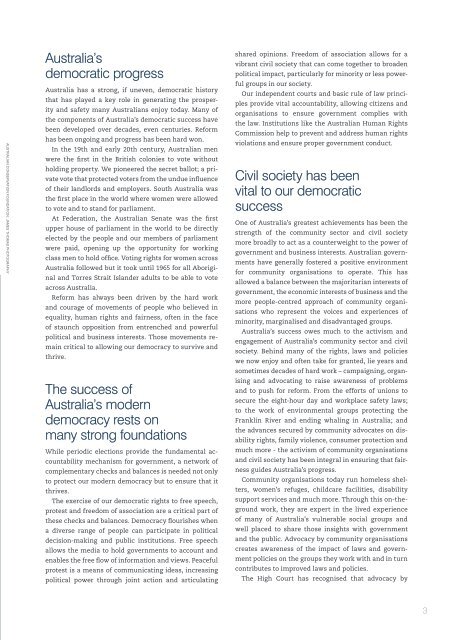Safeguarding Democracy
HRLC_Report_SafeguardingDemocracy_online
HRLC_Report_SafeguardingDemocracy_online
Create successful ePaper yourself
Turn your PDF publications into a flip-book with our unique Google optimized e-Paper software.
AUSTRALIAN CONSERVATION FOUNDATION: JAMES THOMAS PHOTOGRAPHY<br />
Australia’s<br />
democratic progress<br />
Australia has a strong, if uneven, democratic history<br />
that has played a key role in generating the prosperity<br />
and safety many Australians enjoy today. Many of<br />
the components of Australia’s democratic success have<br />
been developed over decades, even centuries. Reform<br />
has been ongoing and progress has been hard won.<br />
In the 19th and early 20th century, Australian men<br />
were the first in the British colonies to vote without<br />
holding property. We pioneered the secret ballot; a private<br />
vote that protected voters from the undue influence<br />
of their landlords and employers. South Australia was<br />
the first place in the world where women were allowed<br />
to vote and to stand for parliament.<br />
At Federation, the Australian Senate was the first<br />
upper house of parliament in the world to be directly<br />
elected by the people and our members of parliament<br />
were paid, opening up the opportunity for working<br />
class men to hold office. Voting rights for women across<br />
Australia followed but it took until 1965 for all Aboriginal<br />
and Torres Strait Islander adults to be able to vote<br />
across Australia.<br />
Reform has always been driven by the hard work<br />
and courage of movements of people who believed in<br />
equality, human rights and fairness, often in the face<br />
of staunch opposition from entrenched and powerful<br />
political and business interests. Those movements remain<br />
critical to allowing our democracy to survive and<br />
thrive.<br />
The success of<br />
Australia’s modern<br />
democracy rests on<br />
many strong foundations<br />
While periodic elections provide the fundamental accountability<br />
mechanism for government, a network of<br />
complementary checks and balances is needed not only<br />
to protect our modern democracy but to ensure that it<br />
thrives.<br />
The exercise of our democratic rights to free speech,<br />
protest and freedom of association are a critical part of<br />
these checks and balances. <strong>Democracy</strong> flourishes when<br />
a diverse range of people can participate in political<br />
decision-making and public institutions. Free speech<br />
allows the media to hold governments to account and<br />
enables the free flow of information and views. Peaceful<br />
protest is a means of communicating ideas, increasing<br />
political power through joint action and articulating<br />
shared opinions. Freedom of association allows for a<br />
vibrant civil society that can come together to broaden<br />
political impact, particularly for minority or less powerful<br />
groups in our society.<br />
Our independent courts and basic rule of law principles<br />
provide vital accountability, allowing citizens and<br />
organisations to ensure government complies with<br />
the law. Institutions like the Australian Human Rights<br />
Commission help to prevent and address human rights<br />
violations and ensure proper government conduct.<br />
Civil society has been<br />
vital to our democratic<br />
success<br />
One of Australia’s greatest achievements has been the<br />
strength of the community sector and civil society<br />
more broadly to act as a counterweight to the power of<br />
government and business interests. Australian governments<br />
have generally fostered a positive environment<br />
for community organisations to operate. This has<br />
allowed a balance between the majoritarian interests of<br />
government, the economic interests of business and the<br />
more people-centred approach of community organisations<br />
who represent the voices and experiences of<br />
minority, marginalised and disadvantaged groups.<br />
Australia’s success owes much to the activism and<br />
engagement of Australia’s community sector and civil<br />
society. Behind many of the rights, laws and policies<br />
we now enjoy and often take for granted, lie years and<br />
sometimes decades of hard work – campaigning, organising<br />
and advocating to raise awareness of problems<br />
and to push for reform. From the efforts of unions to<br />
secure the eight-hour day and workplace safety laws;<br />
to the work of environmental groups protecting the<br />
Franklin River and ending whaling in Australia; and<br />
the advances secured by community advocates on disability<br />
rights, family violence, consumer protection and<br />
much more - the activism of community organisations<br />
and civil society has been integral in ensuring that fairness<br />
guides Australia’s progress.<br />
Community organisations today run homeless shelters,<br />
women’s refuges, childcare facilities, disability<br />
support services and much more. Through this on-theground<br />
work, they are expert in the lived experience<br />
of many of Australia’s vulnerable social groups and<br />
well placed to share those insights with government<br />
and the public. Advocacy by community organisations<br />
creates awareness of the impact of laws and government<br />
policies on the groups they work with and in turn<br />
contributes to improved laws and policies.<br />
The High Court has recognised that advocacy by<br />
3


